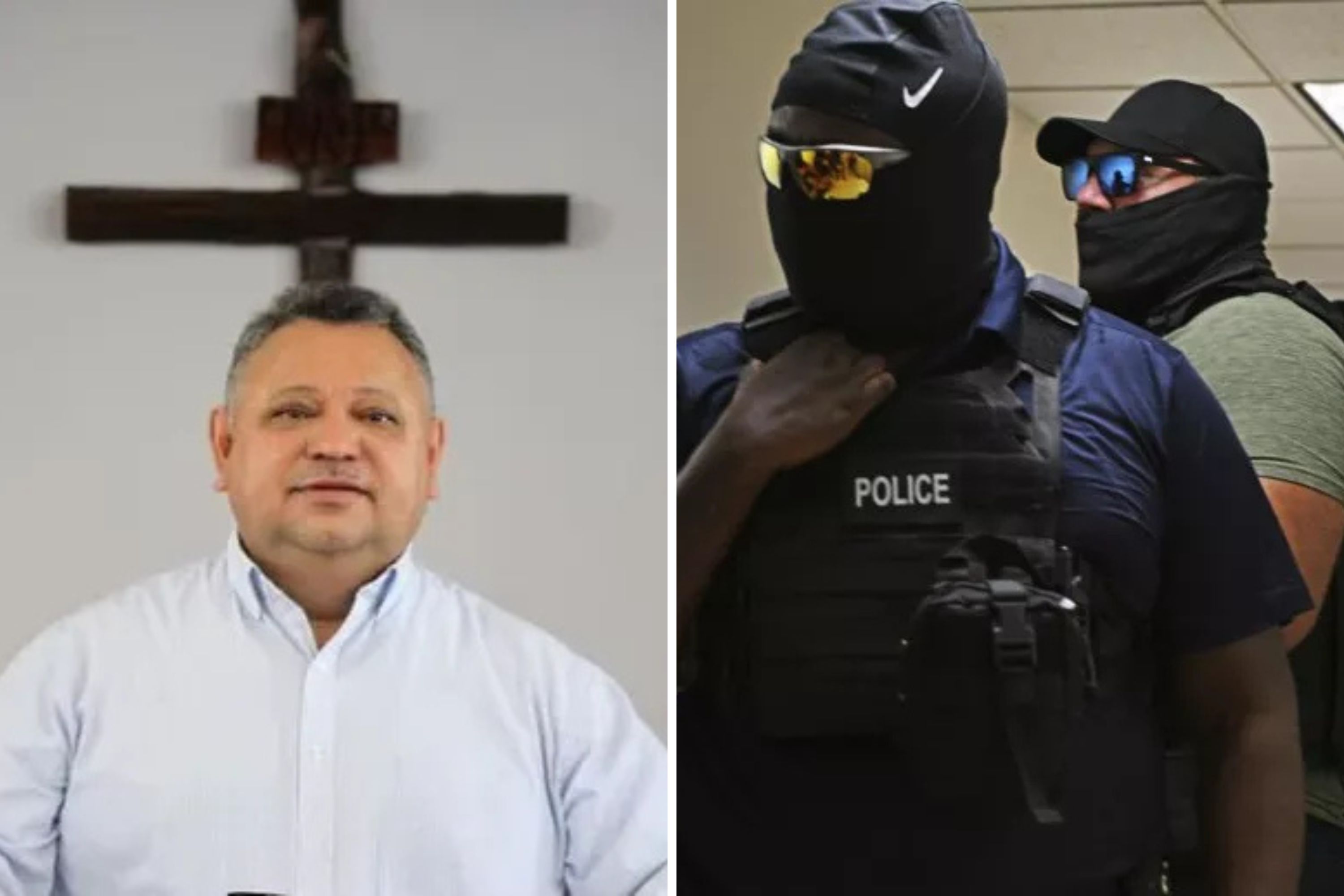An appellate court appears poised to side with the federal judge who blocked immigration agents from conducting “roving patrols” and snatching people off the streets of Southern California, likely setting up another Supreme Court showdown.
Arguments in the case were held Monday before a three-judge panel of the U.S. 9th Circuit Court of Appeals, with the judges at times fiercely questioning the lawyer for the Trump administration about the constitutionality of seemingly indiscriminate sweeps by U.S. Immigration and Customs Enforcement agents.
“I’m just trying to understand what would motivate the officers … to grab such a large number of people so quickly and without marshaling reasonable suspicion to detain,” said Judge Ronald M. Gould of Seattle.
Earlier this month, a lower court judge issued a temporary restraining order that has all but halted the aggressive operations by masked federal agents, saying they violate the 4th Amendment, which protects against unreasonable searches and seizures.
The Justice Department called the block that was ordered by U.S. District Judge Maame Ewusi-Mensah Frimpong “the first step” in a “wholesale judicial usurpation” of federal authority.
“It’s a very serious thing to say that multiple federal government agencies have a policy of violating the Constitution,” Deputy Assistant Atty. Gen. Yaakov M. Roth argued Monday. “We don’t think that happened, and we don’t think it’s fair we were hit with this sweeping injunction on an unfair and incomplete record.”
That argument appeared to falter in front of the 9th Circuit panel. Judges Jennifer Sung of Portland, Ore., and Marsha S. Berzon of San Francisco heard the case alongside Gould — all drawn from the liberal wing of an increasingly split appellate division.
“If you’re not actually doing what the District Court found you to be doing and enjoined you from doing, then there should be no harm,” Sung said.
Frimpong’s order stops agents from using race, ethnicity, language, accent, location or employment as a pretext for immigration enforcement across Los Angeles, Riverside, San Bernardino, Orange, Ventura, Santa Barbara and San Luis Obispo counties. The judge found that without other evidence, those criteria alone or in combination do not meet the 4th Amendment bar for reasonable suspicion.
“It appears that they are randomly selecting Home Depots where people are standing looking for jobs and car washes because they’re car washes,” Berzon said. “Is your argument that it’s OK that it’s happening, or is your argument that it’s not happening?”
Roth largely sidestepped that question, reiterating throughout the 90-minute hearing that the government had not had enough time to gather evidence it was following the Constitution and that the court did not have authority to constrain it in the meantime.
Read more:Trump administration asks appeals court to lift restrictions on SoCal immigration raids
Arguments in the case hinge on a pair of dueling Golden State cases that together define the scope of relief courts can offer under the 4th Amendment.
“It’s the bulwark of privacy protection against policing,” said professor Orin S. Kerr of Stanford Law School, whose work on 4th Amendment injunctions was cited in the Justice Department’s briefing. “What the government can do depends on really specific details. That makes it hard for a court to say here’s the thing you can’t do.”
In policing cases, every exception to the rule has its own exceptions, the expert said.
The Department of Justice has staked its claim largely on City of Los Angeles vs. Lyons, a landmark 1983 Supreme Court decision about illegal chokeholds by the Los Angeles Police Department. In that case, the court ruled against a blanket ban on the practice, finding the Black motorist who had sued was unlikely to ever be choked by the police again.
“That dooms plaintiffs’ standing here,” the Justice Department wrote.
But the American Civil Liberties Union and its partners point to other precedents, including the San Diego biker case Easyriders Freedom F.I.G.H.T. vs. Hannigan. Decided in the 9th Circuit in 1996, the ruling offers residents of the American West more 4th Amendment protection than they might have in Texas, New York or Illinois.
In the Easyriders case, 14 members of a Southland motorcycle club successfully blocked the California Highway Patrol from citing almost any bikers they suspected of wearing the wrong kind of helmet, after the court ruled a more narrow decision would leave the same bikers vulnerable to future illegal citations.
“The court said these motorcyclists are traveling around the state, so we can’t afford the plaintiff’s complete relief unless we allow this injunction to be statewide,” said professor Geoffrey Kehlmann, who directs the 9th Circuit Appellate Clinic at Loyola Law School.
“In situations like this, where you have roving law enforcement throughout a large area and you have the plaintiffs themselves moving throughout this large area, you necessarily need to have that broader injunction,” Kehlmann said.
Frimpong cited Easyriders among other precedent cases in her ruling, saying it offered a clear logic for the districtwide injunction. The alternative — agents sweeping through car washes and Home Depot parking lots stopping to ask each person they grab if they are a plaintiff in the suit — “would be a fantasy,” she wrote.
Another expert, Erwin Chemerinsky, dean of the UC Berkeley School of Law, said the Los Angeles Police Department chokehold case set a standard that litigants “need to show it’s likely it could happen to you again in the future.”
But, he added: “The 9th Circuit has said, here’s ways you can show that.”
The tests can include asking whether the contested enforcement is limited to a small geographic area or applied to a small group of people, and whether it is part of a policy.
“After the injunction here, the secretary of Homeland Security said, ‘We’re going to continue doing what we’re doing,’” Berzon said. “Is that not a policy?”
Roth denied that there was any official policy driving the sweeps.
“Plaintiffs [argue] the existence of an official policy of violating the 4th Amendment with these stops,” Roth said. “The only evidence of our policy was a declaration that said, ‘Yes, reasonable suspicion is what we require when we go beyond a consensual encounter.'”
But Mohammad Tajsar of the ACLU of Southern California, part of a coalition of civil rights groups and individual attorneys challenging cases of three immigrants and two U.S. citizens swept up in chaotic arrests, argued that the federal policy is clear.
“They have said, ‘If it ends in handcuffs, go out and do it,'” he told the panel. “There’s been a wink and a nod to agents on the ground that says, ‘Dispatch with the rigors of the law and go out and snatch anybody out there.'”
He said that put his organization’s clients in a similar situation to the bikers.
“The government did not present any alternatives as to what an injunction could look like that would provide adequate relief to our plaintiffs,” Tajsar said. “That’s fatal to any attempt by them to try to get out from underneath this injunction.”
The Trump administration’s immigration enforcement tactics, he said, are “likely to ensnare just as many people with status as without status.”
The Justice Department said ICE already complies with the 4th Amendment, and that the injunction risks a “chilling effect” on lawful arrests.
“If it’s chilling ICE from violating the Constitution, that’s where they’re supposed to be chilled,” Chemerinsky said.
A ruling is expected as soon as this week. Roth signaled the administration is likely to appeal if the appellate panel does not grant its stay.








